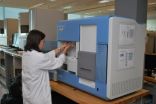K-State research finds that educators should encourage college students to shoot for the stars
2010-10-01
(Press-News.org) MANHATTAN, KAN. -- Less academically promising students should not be discouraged from setting high educational goals, according to one Kansas State University professor's research.
Chardie Baird, K-State assistant professor of sociology, and John Reynolds, Florida State University professor of sociology, looked at the mental health consequences of shooting for the stars versus planning for the probable in their publication "Is There a Downside to Shooting for the Stars? Unrealized Educational Expectations and Symptoms of Depression."
Their research, published earlier this year in the American Sociological Review, recently won the best publication award for the mental health section of the American Sociological Association.
As educators themselves Baird and Reynolds were especially interested in studying college students. Baird said recent research suggests that younger generations have ambitious educational plans.
Additionally, Baird said many social-psychological theories suggest that if people do not realize their plans, they're likely to be depressed. Baird and Reynolds wanted to see if the same would hold in the specific case of educational goals and outcomes.
"We were interested in the topic on a personal level because we want to provide the best advice to our students," Baird said. "We were also interested because there has been a real push toward college for all, and we wanted to see what the consequences might be for pushing those with apparent limited academic potential toward higher degrees."
The researchers used the National Longitudinal Survey of Youth and the National Longitudinal Study of Adolescent Health, which are both nationally representative secondary data sources. Their research ended with positive results: Baird and Reynolds found that there is nothing wrong with encouraging students, even less academically promising students, from pursuing their higher education goals.
"The big story is that we shouldn't really discourage students from shooting for the stars," Baird said. "At least in terms of mental health, there are no real consequences for trying and failing to meet educational plans."
The researchers coined the term "adaptive resilience," which means that people will adapt their reactions to prevent depression if they don't meet their educational plans. For instance, people may actively work to downplay negative feedback by focusing on the best-case scenario or the lessons learned on the way to a failure.
"Considering that there are material and psychological rewards for getting more education, there is just no reason to discourage students or your children from trying, even if it looks like they don't show academic potential," Baird said. "The worst thing that could happen to them if they fail is they will not suffer from depression. The best thing that could happen is that they will live healthier, happier lives like others with higher educational attainment."
INFORMATION: END
ELSE PRESS RELEASES FROM THIS DATE:
2010-10-01
(Garrison, NY) Research ethics review committees often require all women of childbearing age who enroll in clinical trials to use contraceptives to protect against a developing fetus being exposed to potentially harmful drugs. A mandatory contraceptive policy is often imposed even when there is no evidence that a trial drug could harm a fetus or when women have no chance of becoming pregnancy. This requirement is excessive and can safely be relaxed in many cases, according to a report in IRB: Ethics & Human Research.
Policies on contraceptive use in research should reflect ...
2010-10-01
Researchers of the University of Granada, in collaboration with the Centre for Sensory-Motor Interaction of the University of Aalborg, Denmark, and the University Rey Juan Carlos, Madrid, conducted a research on chronic impingement syndrome. The study revealed that excessive activation of specific neck and shoulder muscles during daily life or while playing sports –as swimming– is the cause of a high number of injury and shoulder
A Common Pain
The pattern of the pain originated in these muscles –sometimes in regions far from the shoulder– coincides with most of the symptoms ...
2010-10-01
New research by Rice University scientists suggests that a class of material known as metallacarborane could store hydrogen at or better than benchmarks set by the United States Department of Energy (DOE) Hydrogen Program for 2015.
The work could receive wide attention as hydrogen comes into play as a fuel of the future for cars, in fuel cells and by industry.
The new study by Rice theoretical physicist Boris Yakobson and his colleagues, which appears in the online Journal of the American Chemical Society, taps the power of transition metals scandium and titanium to ...
2010-10-01
KINGSTON, R.I.-– September 30, 2010 –Watching television and its heavy dose of medical content in news and drama can lead to more concern about personal health and reduce a person's satisfaction with life according to a new study out of the University of Rhode Island.
The study, authored by Yinjiao Ye, assistant professor of communications studies found that TV viewing affects people's awareness of health-risks and whether they believe they can protect their own health. People develop these perceptions because TV viewing leads them to believe they have a greater likelihood ...
2010-10-01
A team of chemists from the University of Seville (US) has managed to distinguish between different kinds of tea leaves on the basis of their mineral content and by using artificial neural networks. This technique makes it possible to differentiate between the five main varieties of tea – white, green black, Oolong and red tea.
"This method makes it possible to clearly differentiate between the five types of tea – something that is often not easy to do by eye alone – by using analysis of the leaves' mineral content and then mathematically processing these data", José ...
2010-10-01
Northwestern University researchers have taken another step towards realizing a new class of polymerase chain reaction (PCR) enzyme mimics, opening the door for the development of highly sensitive chemical detection systems that go beyond nucleic acid targets.
The blueprint for building synthetic structures to detect and signal the presence of targets such as small molecule medical analytes (signalers of disease or bodily malfunction, such as neurotransmitters) and environmental hazards, such as TNT, to name just a few, is inspired by biology and its allosteric enzymes. ...
2010-10-01
As researchers and policymakers work toward an effective HIV vaccine in a constrained global economy, cost-effective prevention strategies such as Couples Voluntary Counseling and Testing (CVCT) must take a larger role in efforts to decrease the rates of HIV/AIDS in Africa, says Emory University HIV/AIDS vaccine researcher Susan Allen, MD, MPH.
Allen, who has worked to combat the AIDS epidemic in Africa for more than 25 years, highlighted the value of CVCT and other cost-effective HIV prevention strategies today at the AIDS Vaccine 2010 Conference in Atlanta.
"The ...
2010-10-01
A break in the two chromosomes has given scientists a break in finding a new gene involved in puberty, Medical College of Georgia researchers report.
It's also helped clear up why some patients with delayed puberty have no sense of smell, said Dr. Lawrence C. Layman, chief of the MCG Section of Reproductive Endocrinology, Infertility and Genetics.
The WRD11 gene interacts with a transcription factor that appears to be involved in development of gonadotropin releasing hormones that enable sexual maturation as well as olfactory neurons in the brain, according to a study ...
2010-10-01
Van Den Ende-Gupta syndrome (VDEGS) is an extremely rare genetic disorder that is characterized by distinctive head and facial features, such as unusual eyelids, narrow and beaked noses, flat nasal bridges, jaw deformities, and a turned out lower lip. As part of McGill's "RaDiCAL" project (Rare Disease Consortium for Autosomal Loci), collaborators in Qatar conducted field research with three patients from biologically interrelated Bedouin families, and sent samples to Canada for analysis by GA JOE – a high-tech genome analyzing machine. The research effort was led by husband ...
2010-10-01
Richmond, Va. (September 30, 2010) – Virginia Commonwealth University Massey Cancer Center researcher Steven Grant, M.D., and a team of VCU Massey researchers have uncovered the mechanism by which leukemia cells trigger a protective response when exposed to a class of cancer-killing agents known as histone deacetylase inhibitors (HDACIs). The findings, published in the Journal of Biological Chemistry, could lead to more effective treatments in patients with leukemia and other cancers of the blood.
"Our findings provide new insights into the ways such cancer cells develop ...
LAST 30 PRESS RELEASES:
[Press-News.org] K-State research finds that educators should encourage college students to shoot for the stars



